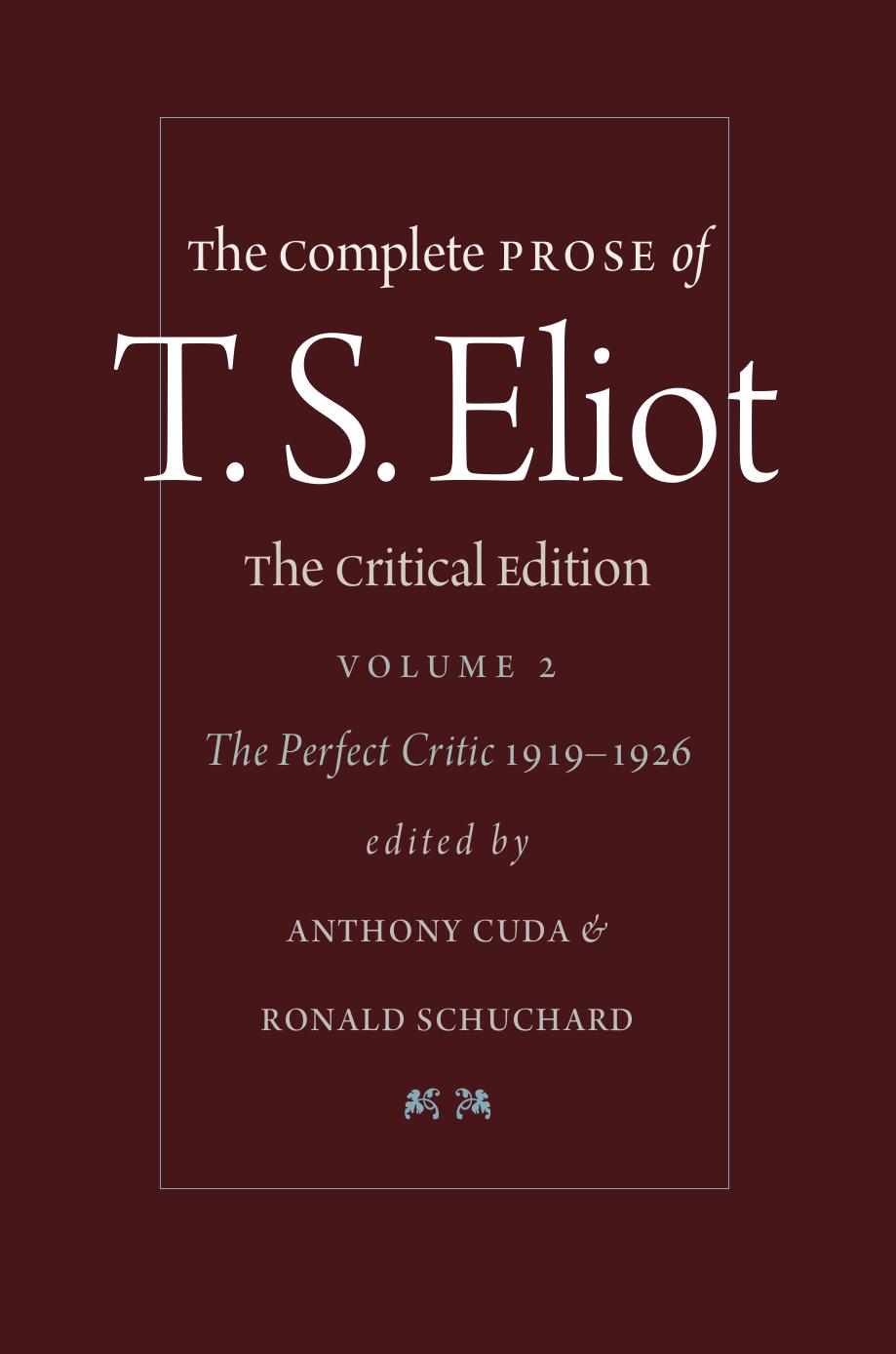

Most ebook files are in PDF format, so you can easily read them using various software such as Foxit Reader or directly on the Google Chrome browser.
Some ebook files are released by publishers in other formats such as .awz, .mobi, .epub, .fb2, etc. You may need to install specific software to read these formats on mobile/PC, such as Calibre.
Please read the tutorial at this link. https://ebooknice.com/page/post?id=faq
We offer FREE conversion to the popular formats you request; however, this may take some time. Therefore, right after payment, please email us, and we will try to provide the service as quickly as possible.
For some exceptional file formats or broken links (if any), please refrain from opening any disputes. Instead, email us first, and we will try to assist within a maximum of 6 hours.
EbookNice Team

Status:
Available4.7
26 reviews
ISBN 10: 1421412950
ISBN 13: 9781421412955
Author: Anthony Cuda, Ronald Schuchard
The Perfect Critic, 1919–1926, the second volume of The Complete Prose of T. S. Eliot, presents Eliot’s major early literary criticism during a transformative period in modernist literature. This comprehensive scholarly edition compiles over 130 works, including both widely studied essays like “The Perfect Critic,” “Hamlet,” and “The Metaphysical Poets,” and previously unpublished or lesser-known pieces.
This volume reveals Eliot’s evolving views on literary standards, tradition, classicism, and poetic theory. It captures his engagement with key literary debates and his role as a critic who helped shape 20th-century literature. The edition is meticulously annotated and edited by Anthony Cuda and Ronald Schuchard, providing historical context, textual variants, and insightful commentary.
It is part of an eight-volume critical edition that aims to offer the most authoritative text of Eliot’s prose, supported by extensive archival research. This edition is essential for scholars of modernism, literary criticism, and Eliot's oeuvre.
Expostulations and Replies
Ecology Then and Now
The Science Wars, Ecology, and the Left
Art for Earth's Sake
What Do Nature Writers Want?
The Perfect Critic, 1919–1926: Introduction
Editorial Procedures and Principles
Acknowledgments
List of Abbreviations
List of Illustrations
Marivaux
The New Elizabethans and the Old
The Post-Georgians
American Literature
A Romantic Aristocrat
Kipling Redivivus
Kipling Redivivus. To the Editor of The Athenaeum
A Sceptical Patrician
Beyle and Balzac
Criticism in England
The Education of Taste
Reflections on Contemporary Poetry [IV]
Dante
The Criticism of Poetry. To the Editor of the TLS
The Poetic Drama
Philip Massinger
Artists and Men of Genius. To the Editor of The Athenaeum
The Perfect Critic
The Perfect Critic. To the Editor of The Athenaeum
A French Romantic. To the Editor of the TLS
The Possibility of a Poetic Drama
A Note on the American Critic
The French Intelligence
Introduction. The Sacred Wood: Essays on Poetry and Criticism
Autobiographical Note. Harvard College Class of 1910, Secretary's Fourth Report
The Romantic Englishman, the Comic Spirit, and the Function of Criticism
The Lesson of Baudelaire
Andrew Marvell
Prose and Verse
London Letter: March, 1921
London Letter: May, 1921
John Dryden
London Letter: July, 1921
London Letter: September, 1921
The Metaphysical Poets
The Metaphysical Poets. To the Editor of the TLS
Poets and Anthologies. To the Editor of the TLS
The Three Provincialities
London Letter: April, 1922
Letter from England (May 1922)
London Letter: June, 1922
London Letter: August, 1922
To the Editor of The Liverpool Daily Post and Mercury
Marie Lloyd
Letter from England: Style in Contemporary English Prose (Dec 1922)
To the Editor of The Daily Mail
To the Literary Editor of The Chicago Daily News
Dramatic Characters
To the Literary Editor of The Globe and Commercial Advertiser
John Donne
Ben Jonson. To the Editor of The Nation and the Athenaeum
The Function of a Literary Review
Contemporary English Prose
Andrew Marvell. A review of Miscellaneous Poems
The Function of Criticism
The Classics in France - and in England
The Beating of a Drum
Ulysses, Order, and Myth
A Preface to Modern Literature
Letter from England (Nov 1923)
Marianne Moore
To the Editor of The Transatlantic Review
Four Elizabethan Dramatists
A Prediction in Regard to Three English Authors
A Commentary (Apr 1924)
A Commentary (July 1924)
An untitled review of The Growth of Civilization and The Origin of Magic and Religion
A Commentary (Oct 1924)
Preface to Homage to John Dryden
A Neglected Aspect of Chapman
A Brief Introduction to the Method of Paul Valéry
A Commentary (Jan 1925)
On the Eve: A Dialogue [with Vivien Eliot]
A Commentary (Apr 1925)
The Ballet
Meeting
Why Rural Verse
Autobiographical Note. Harvard College Class of 1910, Quindecennial Report
English Satire
An Italian Critic on Donne and Crashaw
Shakespeare and Montaigne
Wanley and Chapman
The Clark Lectures: Author's Preface
Lecture I: Introduction
Lecture II: Donne and the Middle Ages
Lecture III: Women and the Fourteenth Century
Lecture IV: The Conceit in Donne
Lecture V: Donne's Longer Poems
Lecture VI: Crashaw
Lecture VII: Cowley and the Transition
the complete prose of t. s. eliot
the complete prose of t. s. eliot the critical edition
the complete prose of t.s. eliot
the complete prose of ts eliot the critical edition
the complete prose of ts eliot pdf
Tags: Anthony Cuda, Ronald Schuchard, The Complete Prose, The Critical Edition